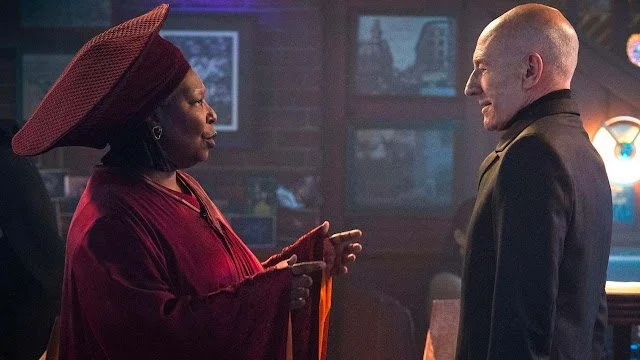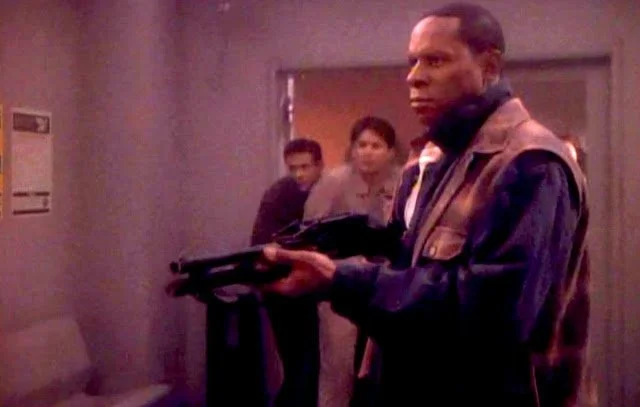Always Political: ‘Star Trek's’ Lifelong Crusade For Progress
What role does science fiction play in commenting on the modern day? And where should Star Trek, arguably America's oldest science fiction franchise, stand on political issues?
The most recent entry, Star Trek: Picard, has courted no small amount of controversy in its currently-airing second season. The stakes are appropriately science-fictional: after seeing a different, "wrong" version of his present, our hero Picard must travel back in time to set things right. This is ground that has been walked by the franchise before, and as with this season's spiritual predecessor, Star Trek IV: The Voyage Home, Picard's past is our present. It helps establish the conflict on familiar terrain for us, the audience, as we watch the visitors from the future fight to save their timeline while also providing some less-than-subtle social commentary.
RELATED:
But that commentary is what seems so controversial in today's discourse. Picard's second season puts issues like poverty and state-sanctioned violence in the foreground, tying them up with the heroes' quest to prevent timeline tampering. Notably, there has been a strong recurring theme of conflict with law enforcement, from physical confrontations with Immigration and Customs Enforcement to tense interrogations by the FBI that highlight judicial overreach. This has inflamed certain corners of the internet, particularly on social media where newer Star Trek properties are routinely criticized for being "woke" and "too political," as opposed to older entries.
How does that assertion stand up, though? Has Star Trek become more political over time, or is this just the latest in a line of stories that work to bring the issues of the day into focus?
Let's take a look at the movie we already mentioned as the forerunner of Picard's most recent turn. The Voyage Home was released in 1986 and focused on the former crew of the Enterprise traveling back in time to prevent a catastrophe. In this instance, they need to save a pair of humpback whales in order to prevent Earth's destruction by an alien probe. The film has a strong environmental message about mankind's role in preserving the natural world. It also lacks a main antagonist: besides the alien probe, which acts more like a force of nature, the only villains are whalers and bureaucracy.
Notably, The Voyage Home was not a departure from the original Star Trek series that spawned it, but instead an extension of its progressive spirit. Besides the simple act of hiring Nichelle Nichols, an African-American woman, in the role of a senior officer, many episodes addressed what were then modern concerns. In A Private Little War, which aired in 1968, the Enterprise is forced to weigh the decision to provide weapons to a primitive society in order to fight a proxy war with Starfleet's ideological rival, the Klingon Empire. This episode came out in the shadow of the Vietnam War, and writer Don Ingalls said that the parallels with current events were deliberate. By the end, Captain Kirk's decision to try balancing the odds by providing the weapons—which he refers to as "serpents for the Garden of Eden"—is framed as a moral failure.
The various sequel series followed suit, with plenty of examples to choose from. Star Trek: The Next Generation, the direct follow-up to the original, has the episode The Measure of a Man, in which the exploratory space opera takes a break for courtroom drama. Data, a Starfleet officer and a uniquely sophisticated android, finds himself the subject of an order that might produce more androids like him but will almost certainly result in his death. His attempts to refuse the order lead to claims that he is property, not a person, and a legal battle over his sentience and right to self-determination. While the premise is undeniably science fiction, the question at the episode's heart is significant for all time: who is it that deserves to have rights, and who gets to decide? Notably, Whoopi Goldberg's character Guinan delivers the argument about "whole generations of disposable people"—hearkening back to the evils of American slavery.
But when it comes to being political and eerily prescient, no Star Trek series comes as close as Deep Space Nine. The first Trek show to embrace a serial storytelling format, as well as the first to be set primarily outside the bounds of the utopian Federation and to show Starfleet at war, it was controversial in its time but is now widely considered to be one of the most important TV shows of its time. While it gives us many standout examples—from the authoritarian anti-shapeshifter measures in Paradise Lost that foreshadowed the real-world PATRIOT Act by half a decade, to Avery Brooks's chilling "I can live with it" monologue after bribing, lying, and covering for a murder to bring the Romulans in on Starfleet's side in In the Pale Moonlight—perhaps the most relevant here is the two-parter called Past Tense.
Another time travel narrative, these episodes deal with Ben Sisko (Brooks) accidentally traveling back in time to 2024 (another Picard connection) and becoming involved in a historical conflict known as the Bell Riots. Inspired by the Attica Prison Rebellion that happened in 1971, the story focuses on impoverished masses of people forced into so-called "Sanctuary Districts" for being unable to support themselves, whether due to infirmity, mental illness, or simple bad luck. Sisko has to take the place of Gabriel Bell, who protected civilian hostages after the Sanctuary District's residents rose up to demand better conditions, and whose martyrdom at the hands of overzealous law enforcement was a formative inspiration for the Federation in the future.
The role of Sisko, played by a black man, taking on the meaningful sacrifice of another black man was a powerful message. But life, as they say, imitates art: as production on the Past Tense episodes came to a close in 1995, the mayor of Los Angeles announced plans to enclose the city's homeless population in special "havens." It was a parallel that was so explicit, the cast and crew were understandably disturbed by it.
The simple fact is that these are just a few examples from Star Trek's half-century of storytelling. They also happen to be the most emblematic of Trek politics: progressive to a fault, aware of how people can falter and lose their way, but ultimately based on the idea that people can be better than they are. As we head into the finale of Picard's second season, we should remember that this insight is what has helped the franchise withstand these many tests of time.
READ NEXT:
Sources: The New Yorker, The Atlantic




